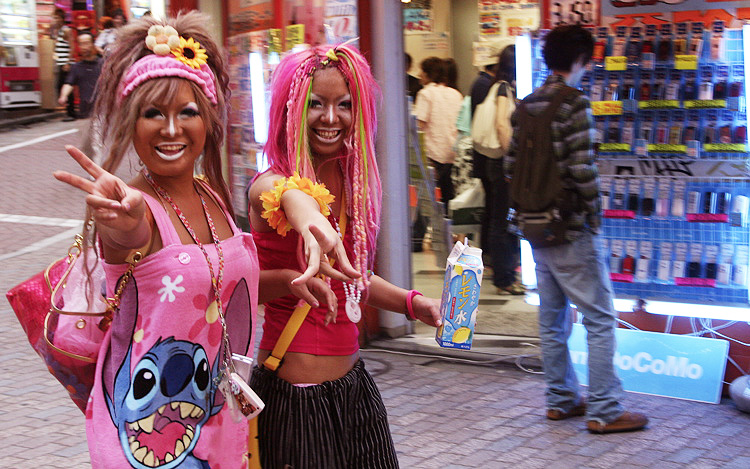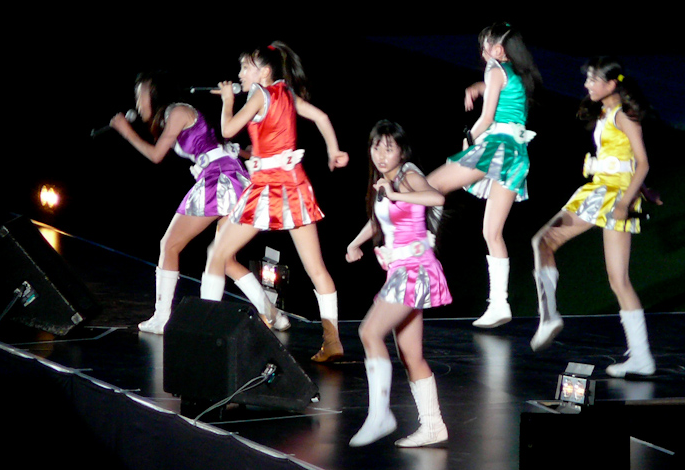Iconic Japanese music ensemble RATS & STAR and “girl idol” group Momoiro Clover Z recently appeared together on a popular television program sporting “blackface” makeup, sparking a debate about whether the practice can be deemed racist in Japan.
In order to project an aura of “blackness,” aging Doo Wop ensemble RATS & STAR have used blackface as trademark since they got their start in 1977.
Prior to their appearance with RATS & STAR, Momoiro Clover Z (aka “Momokuro”) recently developed a reputation for collaborating with glam metal acts. Like the American band KISS and other similar performers, glam metal bands sport heavy and outrageous makeup. In a new twist on the makeup theme, Momokuro decided to appear on TV in blackface with RATS & STAR.
Indeed, a not inconsiderable number of entertainers and comedians perform in blackface in Japan, where it has largely been unremarkable. In the age of social media, however, voices outside Japan are becoming more critical of what has been considered a playful and innocuous practice.
New York Times reporter Hiroko Tabuchi, who, with Martin Fackler was once the Times’ chief correspondent for Japan, was quick to point out the inappropriate and discriminatory nature of casually sporting blackface for entertainment.
Why Japan needs to have a conversation on racism (1) https://t.co/o07lYKoYri Preview of a TV show airing next month. pic.twitter.com/KDoDPVz6xJ
— Hiroko Tabuchi (@HirokoTabuchi) February 12, 2015
Tabuchi's remark was retweeted more than 700 times, igniting a discussion about whether or not blackface should be seen as racist in Japan.
Some Twitter commenters pointed out that, removed and transplanted from its American context, Japan's use of blackface is not intended to be racist, since most Japanese people have no idea of the cruel and racist origins of the practice.
Other Twitter users such as seth0et0holth agreed with Tabuchi that, intentional or not, the use of blackface in Japan is indeed discriminatory.
@HirokoTabuchi I agree. Also, “unintentional” racism is a huge problem: people not even necessarily trying to be racist but also not…
— seth0et0holth (@miscastdice) February 12, 2015
@HirokoTabuchi not ever having had their privilege checked or not ever having experiences outside their own race/ethnicity/culture.
— seth0et0holth (@miscastdice) February 12, 2015
Others disagreed with this argument:
@HirokoTabuchi I'm just trying to understand how it's racist if there isn't malice in it. Arrogant, yes. Racist? Hmm…
— matty manzarek (@matty_125) February 12, 2015
Others argued that the use of blackface by entertainers in Japan was, in fact, a sign of respect for black people.
Twitter commentator @E=mcZ said that according to the Japanese way of thinking, making one's skin “black” was not racist, but is instead could be considered the purest form of flattery.
別に黒塗り=黒人差別とは言えない。白人と違って? 黄色人種は日焼けすればだいぶ黒くなる(例 松崎しげる ヤマンバギャル 〜)から、アジア人が黒人音楽に憧れればだいたい日焼けするし、ラッツ&スターやももクロもそこへのオマージュなのでOK。ガングロブームは差別じゃない
— E=mcZ (@EzmcZ) February 13, 2015
In a Japanese context, you can't say “sporting blackface equals racism.” We're not Caucasians. When Asians get a suntan we get pretty dark (think of Shigeru Matsuzaki or Yamanba Girls). So if Japanese performers want to play “authentically black” music, all they have to do is go out and lie in the sun. So, what RATS & STAR and Momokuro did is a kind of homage [to black performers]. [In the same way] the Ganguro trend from the 1990s wasn't racist either.

Ganguro. Image courtesy Flickr user Traitlin Burke. CC BY 2.0
Another Twitter user attempted to take the concept of “blackface as homage” to its most logical extreme:
ももクロが顔黒塗りで人種差別だ!という話。差別は意図のある無しとは関係ないので仕方ないと思う。リスペクトと言ったって、肌が黒いのをリスペクトしてるわけじゃないでしょ。 白人や黒人が顔を黄色く塗って演歌もどきを歌ってたら、芸として受け入れても100%愉快というわけにいかないでしょ。
— キラアキラ@大きな羊 (@kila_a_kila) February 14, 2015
By putting on blackface, Momokuro were being racist! It doesn't make any difference if they didn't intend to be racist. It's not respectful at all! For example, if white folks or black folks donned yellow makeup and started singing enka [Japanese country and western songs] you could never argue it was “art.”
In reply, Twitter user Michael. A said that it can't be helped if blackface is interpreted as racism outside of Japan.
彼らの音楽性を考えればシャネルズが黒人をレスペクトして黒く塗ったという話は多分嘘ではないと思う。ももクロも顔のペインティングを色々やってる中でシャネルズのコスプレをしただけ。どちらにも差別意識はないと思う。でもそれで済むのは国内限定だと知っておくべき。
— Michael. A (@nasitaro) February 15, 2015
If you think about their entire musical style, I don't think it's being disingenuous at all to suggest that RATS & STAR did start out (back in the 1970s when they called themselves the Chanels) sporting blackface as a form of homage to black entertainers.
And Momokuro has been experimenting with face paint recently. When Momokuro adopted blackface while appearing with RATS & STAR they were just engaging in cosplay.
They had no idea what they were doing might be considered racist. However, you need to take into consideration the context that they did it in Japan when contemplating whether what they did was racist.
A commenter on this Japanese-language news article, which asks black residents in Japan about the controversy, says:
黒塗りが人種差別という経緯調べてもあんまりないんだけど、ミンストレルショーがそれであれば悪いのはその認識を定着させたショーであって、黒塗りしても差別と思わない世界を作ったほうが幸せな気はするよなあ
While I haven't researched all the details about racist aspects of blackface, blackface was used very intentionally in minstrel shows for bad effect. We need to create a world where putting on blackface has no racist connotations.
However, according to Diana Powell, an African-American student interviewed for the article, Japan needs to understand what black people have experienced in the first place:
黒人文化に憧れ、リスペクトするのは構わないが、黒人文化の背景にある歴史も理解すべきだ
If Japanese people want to show respect for or pay homage to black culture, they need to understand black history first.







6 comments
It is not necessary to don black-face to pay homage to African-American entertainers and their music. Altering your skin color or features is not a requirement for enjoying, honoring, or paying tribute to the soulful and rhythmic sounds of the music, or in celebrating other arts. A person only needs passion and love for the artistic styles to demonstrate their appreciation.
I couldn’t agree more @Sacha. Racism needs to be disconnected from
intent and seen for what it is: systematic, often invisible and
unintentional, with harmful, discriminatory results. Harm is often done
without intent.
No one gives a fuck what Americans think, how about asking black Japanese their opinion on the matter. American culture and lens is not universally accepted, regardless of what Nationalistic twats think.
Japan has long been having the superiority complex…over Koreans and Chinese…and need to be treated from the sickness of racism and prejudice….
It’s ironic that people talk about racism in an American context when talking about Japan. The only racists here are the ones claiming racism! Stop oppressing Japanese culture you cultural supremacists!